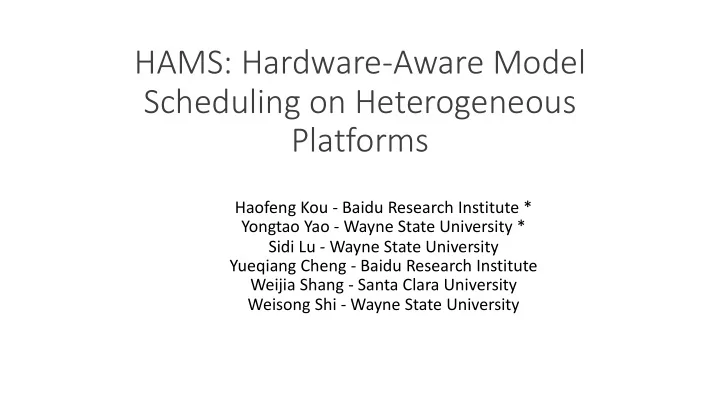

HAMS: Hardware-Aware Model Scheduling on Heterogeneous Platforms Haofeng Kou - Baidu Research Institute * Yongtao Yao - Wayne State University * Sidi Lu - Wayne State University Yueqiang Cheng - Baidu Research Institute Weijia Shang - Santa Clara University Weisong Shi - Wayne State University
Problems How to concurrently & efficiently deploy and execute the collaborative models on heterogeneous devices with different deployment constraints? ● The real-world applications usually require collaboration of multiple DNN models on edge computing platforms to finish complicated tasks with outstanding performance ● Explosive growth in model size, computational requirements, increasing number of involved models and devices
Previous Work One-to-One: One DNN architecture to one hardware platform ● Design a network architecture that is both accurate and efficient on a given edge device ● Train a separate model for each device of interest and each latency budget of interest ● Too resource demanding for the case-by-case deployment environment ● Not practical enough when the real-world application requires the involvement of multi-models and diverse devices at the same time
Our Research - Innovation Many-to-Many: providing actionable insights on scheduling the efficient deployment of a group of collaborative DNN models among heterogeneous hardware devices and assessment of our proposed partition and scheduling algorithm ● The multiple models scheduling problem for the edge computing tasks in the heterogeneous environment has not been deeply studied yet. ● Our proposed framework is the pioneer that points out the importance of this new research direction with useful insights for related research.
Our Research - Algorithm Many-to-Many: providing actionable insights on scheduling the efficient deployment of a group of collaborative DNN models among heterogeneous hardware devices and assessment of our proposed partition and scheduling algorithm ● We have demonstrated the applicability of the proposed scheduling algorithms MFS and HFS , in three typical application scenarios of the computer vision field, with the ability of hardware adaptive self-learning to automatically schedule the deployment and execution of multiple models on heterogeneous edge services
Our Research - Result Many-to-Many: providing actionable insights on scheduling the efficient deployment of a group of collaborative DNNs among heterogeneous hardware devices and assessment of our proposed partition and scheduling algorithm ● Our analysis reveals that HAMS can balance computation resource utilization and reduce the inference time of the whole group of models up to 28.77% .
NCO & NCA HAMS contains two core components: NCO - Neural Computing Optimizer responsible for training, optimizing, and transforming DNN models into a hardware-specific format so that the model can fit a given hardware platform well NCA - Neural Computing Accelerator integrate of HAMS that contains our proposed design
FPS Matrix Matrix Generation: ● Calculate FPS of each model running independently on each device ● Overall inference speed dependent on where the slowest speed is
MFS Target at finding an appropriate model for edge devices ● ModelAllocations ● QueryWorstCaseModel ● QueryModel
HFS Aim to find a suitable edge device for specific models ● DeviceAllocations ● QueryWorstCaseDevice ● QueryDevice
Single Service The individual service models assigned to their most suitable edge devices Overall FPS for each service will be calculated saperately ● Service F: MFS & HFS leads to the same FPS(5.64), 28.77% higher than default FPS (4.38) ● Service P and Service V: HAMS improve FPS by 2.58%
Multiple Service Three sets of 11 models assigned to their most suitable edge devices VPUs can be expanded - one model to one edge device Overall FPS for all services & models are calculated together ● Service F/P/V shows better FPS than default FPS scheduling
Open Discussion ● Task-Level Scheduling on Heterogeneous Platforms StarPU on HPC ○ ESTS on HCS ○ OmpSs ○ AlEbrahim ○ ● Neural Architecture Search MnasNet ○ DARTS - Differentiable ARchiTecture Search ○ FBNets - Facebook-Berkeley-Nets ○ Once-for-All ○ ● Gap between Previous Work Compared with Task-Level Scheduling ○ Compared with Neural Architecture Search ○
Summary ● Prove the importance of model scheduling for multiple DNNs and heterogeneous edge devices with diverse computation resources ● Key concept is Worst-Case-First for hardware-aware models scheduling ● Introduce and discuss two scheduling algorithms and get the evaluation results of three DNN groups on CPU, GPU and multiple VPUs ● The evaluation results demonstrate the effectiveness of HAMS on accelerating the co-inference of multi-models on the heterogeneous edge devices by up to 28.77%
Acknowledge & QA ● Thanks for the collaboration from WSU, SCU and BRI ! ● Thanks SEC20 offering the chance ! ● We can be reached at: BRI & WSU & SCU kouhaofeng@baidu.com ○ yongtaoyao@wayne.edu ○
Recommend
More recommend